“My Autistic Child Destroys the House” – The Google Search Results Series – Part 2

A few weeks ago, I did a quick search of, “my autistic child” to see what parents of autistic children were searching for, so I could write content based on what they needed most. Well, did I have a rude awakening when the first result that showed up was “my autistic child makes me miserable”. Yikes!
However, as an autistic adult, I’m here to translate autistic behavior, so I’m going to make the most of it with a series based on these searches.
Why Does My Autistic Child Destroy the House?
Destructiveness, at least in my opinion, is a matter of perspective. When I think of the word “destructive”, I think of purposeful behavior exhibited with the intention to destroy, harm, or cause chaos.
When an autistic child is seen as “destructive”, they are usually seen as acting in anger with the express intent of breaking something or otherwise rendering it useless. Because of that, they are often punished as though they committed a purposefully cruel act. The behavior is addressed, but the reason for the behavior isn’t, which only leaves the child feeling confused, misunderstood, and frightened.
Here are some common reasons your autistic child may appear to be destructive:
- Your child is trying to communicate with you.
All behavior is communication. Read that again. All behavior is communication. If your autistic child is knocking family heirlooms off shelves, this act may make you feel angry and even violated, but the intent of the behavior is more than likely not to harm you or your stuff. Rather, your child is at their wit’s end trying to get their needs met because all other previous attempts at communication on their part have failed.
TW: Eating disorder, self-harm, addiction mentions.
This is the problem with the behaviorism approach when teaching autistic kids. You can address what you believe is “destructive behavior”, but that only teaches masking, stuffing down big emotions, and finding other more “socially acceptable” forms of venting those feelings such as drinking alcohol, using drugs, not eating, binge eating, and cutting.
Those feelings need a way out, and behaviorism (ABA) just frightens its victims into complying to stay emotionally safe while also finding less obvious but very unhealthy ways to cope.
- Your child doesn’t know their own strength.
If your autistic child is breaking their younger sibling’s toys, for example, it’s possible they either don’t know how to use them as intended, or they don’t realize their own strength. Autistic people often struggle with using the correct muscle groups to open or operate things, which can cause them to unintentionally break objects. We may also struggle with knowing right from left or up from down, so if something is supposed to be opened one way, for example, we may turn it too far the wrong way and break it. It may look purposeful, but it isn’t. We are usually confused and devastated when something breaks because of this as we had no intention of doing it.
- Your child is in a meltdown and unaware of their surroundings.
When an autistic person is experiencing sensory overload, our bodies go into fight-or-flight, and everything inside of us operates on either fighting whatever it is that’s hurting us or running away from it. There are no other thoughts, feelings, or rationalizations. During these moments, we may run smack into something and just keep going, our minds and bodies desperately screaming to escape the sensory assault.
For example, let’s say your fire alarm goes off while you’re cooking. You may be bothered by the sharp sound, but, for your autistic child, the noise is like an ice-pick driving through their ears, the sound vibrating through their teeth and into their brain, halting all thought processes and propelling them into blind, panicked motion to escape.
If Grandma’s expensive glass vase happens to be in the way of an autistic child in full fight-or-flight during a sensory assault of that magnitude, chances are, he could knock it over and even cut his foot on the broken glass and still keep going, not feeling the impact or the cut in his desperate attempt to get away.
I’ve knocked many things over during my childhood and had absolutely no memory of what happened because my “lizard brain” had taken over to get me to safety. That may be what’s happening to your child, as well.
If that’s the case, they’re already in a state of total panic. Yelling or lecturing is the last thing they need, and they won’t understand you anyway. They’ll just think you’re yet another scary thing they need to get away from.
- Your child has poor proprioception and dyspraxia.
Proprioception is the body’s internal ability to tell where the body itself ends and other objects begin. Autistic people often struggle with this sense. It can be very difficult for us to accurately judge the distance between ourselves and whatever breakable item happens to be near us.

Furthermore, many of us have dyspraxia, which means we have trouble keeping our balance and orienting ourselves in space, which can lead to missteps while walking, arm flailing to avoid falling, and grasping whatever object happens to come to hand.
- Your child is sensory-seeking.
Another reason your autistic child may be destroying your house is that she is sensory-seeking. Not all autistic people are sensory-avoidant. In fact, some seek more sensory input, not less. Most of the time, though, it’s a varying but extreme combination of the two–sensory-seeking and sensory-avoiding, depending on the input.
I, for example, avoid sharp sounds and sensations. I cannot stand them. I don’t like the sound of alarms, ambulances, certain motorcycles, and stinging sensations like needles or rubber band snaps. However, I find comfort in deep, thudding bass tones, firm grips, and deep pressure.
You may find that your autistic child grabs a bunch of things and puts them on top of herself for a deep pressure experience. What you may see as destructive or chaotic is a way for her to regulate her emotions and sensory input.
This is just one example. Look at your child’s behavior from a sensory angle to see if that could be the cause.
How to Help Your Autistic Child When They Act in Destructive Ways

- Discover the “why”.
After reading this article, ask yourself if any of these reasons sound like the reason your child is exhibiting destructive behavior. Is it sensory? Is he trying to communicate? Does she need an AAC device? Once you discover the reason behind certain behaviors, you’ll be much better equipped to redirect them.
- Fulfill sensory needs.
Fulfilling sensory needs is imperative for an autistic child. It’s not a step you can skip. If your child seeks out firm pressure, give that to him in the form of a weighted blanket, weighted toys, or a sensory sock. If she needs to rock or spin, find toys that offer that particular input in a safe, healthy way.
Also, do not stop your child from stimming if the stims are not harmful. Stopping stimming in an autistic person can cause emotional dysregulation and may inadvertently lead to behavior that would be labeled destructive.
- Practice emotion regulation.
All human beings, regardless of neurotype, experience big feelings, and those feelings need to be identified, acknowledged, understood, and processed.
I didn’t learn emotion regulation myself until I was in my mid-thirties through an emotional regulation class that used dialectical behavior therapy (DBT). I was 35!! I should have learned how to regulate my emotions when I was a child, but that didn’t happen.
In fact, I remember being absolutely shook when I discovered emotions were something that could be regulated. That was brand new information to me at the time–oh, and did I mention I was 35??
I don’t want this to happen to your child. Had I known what emotion regulation was when I was younger, I could have avoided so many terrible experiences in my life.
- Put away breakable things.

You may think it’s important to teach your autistic child “respect for the property of others”, but if they are behaving in ways that appear destructive, for whatever reason, now is not the time to teach that. Put away valuable and breakable objects. Not only will it give you peace of mind, but it will help your autistic child feel freer to move about their home without extreme anxiety.
- Learn about your child’s unique brain and individual triggers.
I cannot stress this enough in every article I write that’s aimed at parents of autistic children: Learn your child’s brain. Autistic feelings, thoughts, emotions, intentions, and ways of processing the world are different from that of neurotypicals. Not less, not pathological, just different. Not understanding these differences can lead to a lifetime of traumatic misunderstandings.
Also, learn your child’s individual sensory triggers. What sounds, smells, tastes, textures, etc., upset them? What sounds, smells, tastes, and textures do they enjoy? Knowing these things will go far in keeping both you and your kiddo calm and regulated.





What if the autistic child is doing things like writing on walls and furniture and tearing holes in door screen
Hi, Candi. I think the important thing is to first get to the bottom of what these activities are providing for your child. For example, is it a way to stim, express creativity, communicate, satisfy curiosity, show frustration? Once you know the underlying cause, then you can address the problem from the best angle.
So, do you have an autistic child?
No. I don’t have children. I’m an autistic adult who was an autistic child.
I have two autistic children. Both are very bright but one, the girl (both are 6), is VERY destructive. She is very powerful athletic, and she will attempt to open or take apart everything or pour water into anything and floods rooms. She has done thousands of dollars of damage. It’s unreal and this is after babyproofing beyond imagination. I have no stove, oven, table, chairs, and cabinets are glued shut.
My son is similar but he’s only 3 and slowly his ability and the damage is ramping up. I know he can’t help himself I’m upset but not angry. How have you made your peace with not living properly in your own home. I’m struggling with the relentlessness and the grief of never having anything nice or clean or comfortable ever again.
I have an 18 yr old girl she is full spectrum w/ severe cognitive delay. Hang n there buddy. Expect the unexpected always. Do not lose sight of the objective. Keep them safe, provide positive feedback after every good behavior. Since he is only three years old, it is imperative that you do not baby him. It will make things worse. As you begin to learn his triggers you will learn more about your child’s behavior. Routines are a big one. Cloudy days are a big one “ for my child “ . Take courage and know that the Lord our GOD is calling you to pick up your cross and keep going. Young man your are truly blessed with this opportunity of caring for GODS special angels. The path is narrow and difficult but you can do it!
My 7yr old granddaughter had her worst meltdown to date tonight.,culminating in her pulling splinters if wood from the windowsill and breaking off the thermostat from the radiator in her room. We know it’s her sensory profile that troubles her most but try as we might we cannot get a handle on it. When she is calm every suggestion is met with a negative response eg weighted blanket, sock, fidget, how full is your bucket etc. She kicks, hits, punches and is so very much in her zone that we can’t reach her. Her safest space is her room upstairs, but of course it is a dangerous manoeuvre to get her there. There is also a younger sibling we have to be aware of. I think it is the shock of what appears to be ‘aggression’ that sends is neurotypicals, sideways but oh! If we could just find one wee tiny thing that would help her find a little calm……
I’m so sorry that’s happening! It sounds like things are very difficult for your family right now. Are you aware of what could be triggering her meltdowns at this stage?
Try an indoor swing. Our daughter loves and is calming
For my asd son, who is 8 years old, his destructive behavior is triggered by things that he gets angry about. A lot of times it’s irrational- doesn’t make sense to us. For instance, he got mad at a kids show where the good guys “won” and he really wanted the bad guys to win. So he went outside and started destroying the yard (again), purposefully throwing even big objects (like his climbing structure) and trying to break things with a kids baseball bat and a brick patio paver (he found one even though I had tried to remove them all from the yard). I have to hide all of his little brother’s toys, or he will destroy them into tiny pieces. I have to hide his little brother’s swords and baseball bats as he will use them against us as weapons, trying to hurt us. He’s broken a house window because the tv paused for a commercial, he threw a brand new little metal toy car at the window. He broke a big bathroom mirror the other day by slamming his head into it- he was mad that he had to pee. He digs up the yard on purpose and will destroy the sprinklers if he gets his hands on them. We already have a huge sand box we had built for sensory seeking (he rarely uses it), we have a swing set, a hammock and a climbing structure. But he’d rather dig up the yard and destroy and throw things. He’s even broken metal items like a watering can. We also have a 6 foot basketball hoop in the yard as he was into basketball for a while, but now he tries to knock it over to destroy it. We’ve had OT (he was kicked out of 2 OT places) for years, he’s had an IEP and ot and speech at school since he was 4 years. Now he’s in a special very small school with only 4 kids K-5th, he gets weekly counseling in addition now. But we feel like we have no answers, no one who can explain why he’s so destructive and mad all the time.
I’m going to send you an email, so we can speak further about this.
Hi Jaime we have a 5yo child who we look after 24 hours a day in out of home care…He’s beautiful! but we are experiencing the same kind of issues as Denise who wrote to you on September 4, about not knowing what the triggers were for their child and the child being angry and destructive. He uses toys as missiles to throw at us and will use the nearest item to hurt us. do you have any advice?
Hi, Debbie. I sent you an email. 🙂
Good day, my ASD child turns 13 in a month. He is also destructive when he gets angry. I am in the same position. Wifi is buffering, he will break the cell phone in half. He broke 5 playstation remotes because he cant pass a level on the game. TV remotes dont last because if he wants to change a channel and the tv paused, he breaks the remote into pieces. I cant even count all the remotes that is broken all ready. IPADs, Cellphones, Playstations, cellphone chargers.
I would really appreciate some advise on this destructive behaviour. He likes playing playstation. Then when he struggle with something he will just bang the remote and break it. This is as if he doesnt realise that moment what he did wrong. Afterwards he realise then throw the stuff away because he knows he will be in trouble for that. Talking does not seem to do the trick. We are hiding all electronics from him. He then just go outside and throw stuff around. We even find out he threw our glassware into the neigbours yard. Please advise on how to handle this.
He always promise he will take care of something, after some time he gets angry about nitty gritty stuff and become destructive again.
This sounds like my 3yr grandson. He has broken toys and televisions and gets so angry. We do not know what to do as well
Mi nieto va cumplir dos anos y apenas le va a dado por destruir cosas como el sillón de cuero de su otra abuela también va a tratado de destruir la tela de mis sillón. Pero yo le digo firmemente que pare que eso no se hace y lo abrazo fuerte y entiende y se va y busca algo en que entretenerse se le pasa la obsesión y a un niño con Autismo nunca se le dice la palabra no porque eso los ponen agresivos las tabletas son mucha ayuda para que BBC ellos aprendan y también los calma
Hi My son loves breaking glass, ceramic and breakable plastic things. I think it’s an auditory stim, he’s not upset or over stimulated when he does it. He just likes the sound and it’s very impulsive. I can’t turn my head or he’ll break something. I hid and locked all breakables with the expecting of the cover of the toilet bowl tank which I can’t hide and need. He was taking a shower and I sat down for 2 min to work and I heard him lifting the tank , ran to the Bathroom which is 5 feet away from me and I couldn’t get there on time. He shattered the toilet tank cover (he’s a tall 10 year old). How do I get this to stop if it’s a pleasurable sensory input but unsafe habit? I can put a plastic toilet tank cover but I can’t do that to my moms house or if I decide to visit a family member.
If it’s an auditory stim, you can try having him watch videos of glass and other objects breaking while he’s wearing headphones. (As long as it’s nothing actually violent.) They have stuff like that on TikTok, and I think YouTube. You’d have to monitor the content carefully, especially on TikTok, but on YouTube, you could make a playlist with different shattering noises. There are also sensory aids/stim toys that make clacking sounds that he might like. Here is one I found on Amazon that has pretty good reviews: https://amzn.to/3rpPkS3 (They’re small, though, so if he tends to swallow things, you might want to get a bigger sensory aid/stim toy for him, so it’s not dangerous.)
My brother and his family, wife and autistic son, live in my house as he mortgaged his and the bank took him to court to foreclose it. He and I have been at odds over hereditary issues for the past year with some arguments in the house. My nephew, autistic, this summer suddenly out of the blue, started breaking things in the house (mine) that he lives in. Initially, diagnosis was bipolarity, then schizophrenia, now the doctor is saying psychotic episodes. According to my brother, my nephew only reacts this was when I’m around as when his wife’s sisters come, my nephew is docile and normal. I have since then been barred from going to see my nephew, whom I dearly love.
my 7 year old son is now on a destructive bent and I can’t use the bathroom without him having a fit and breaking everything in the room and pouring water on everything. if I have a cup of water it’s getting knocked off. i have hid everything on top of shelves even my working laptop because he will try to break it because I refuse to let him in the bathroom with me. my mom said just let him in, i said no I want my boundaries. I’m tired of bending backwards for this kid. he doesn’t act out when around others, only me. now he’s been bad in school, keeps running out the classroom, had knocked everything over and kicked the teacher. I’ve had it, he makes my life miserable. I’m going to put him in a home.
My nearly 4 year old has broken around 6 large smart tvs ,he throws anything around him when he has a meltdown ,breaking glasses ,phones ,toys ,anything he can ,he has a twin brother who does not do this at all ,he watches movies on repeat ,is violent to anyone near him ,he has become addicted to his older brother xbox ,when we say no he has a meltdown, staff at school say he is fine there ,he’s not had any type of diagnosis yet I wanted to see if it’s a phase but even as a 6 month old he used to headbang ,to the point it was painful but he would carry on ,again his twin brother does not display any behaviour like this
Hello, Gemma. I’m going to send you an email about this.
My verbal (but not high functioning) 16 year old son destroys everything in site when he is upset or something doesn’t go his way or something makes him angry. I have replaced more doors and more holes and walls than I can even count. He destroys TVs, phones. He will throw anything that he can get his hands on. I am at my wits end. I don’t know what to do anymore or where to turn for help. We have tried medication‘s with not much luck… Too many negative side effects. I am very afraid of putting him somewhere because I know he will be harmed because he gets so out of control and he’s not anymore, but I don’t have him because I have no money!! I just keep trying to survive day by day as long as I can And praying for some kind of relief for help.
Hello, Tracy. I’m so sorry you’re dealing with this. I’d like to talk with you about some possible solutions. I offer private consultations, and I also work with a former paraprofessional and mentor who works with autistic children and teens. Please get in touch via email: thearticulateautistic@gmail.com.
Hey there, Jaime! I was wondering if it would be okay to email you privately about some issues I’m having with my High Functioning Autistic 8 year old son. I’m a single mama and it’s just him and me. I am only one person and feel like I am failing him in some way. This past 6 months is when he started being super destructive and we are in an apartment complex so, I am having to pay to replace things in the unit. I need to try and get to ‘why’ I guess? I can answer any questions you have for me. He sees a psychiatrist as well as a psychologist plus a few therapies at school. I have so much hope for my little man cause he is super smart and has amazing creative and musical talents! Plus when I look in his eyes, I’ve never known love like that. If I could speak with you via email it would be greatly appreciated as I just want him to be who he is and get the help he needs and deserves. He is a completely different kid in school as a pose to home and am trying to make sure I’m getting it right and doing the best I can for him to grow into an amazing young man.
Hello, Sarah-Elizabeth. Of course, you can email me! I’ll send you an email to this address from thearticulateautistic@gmail.com.
I have a 19 year old son with high functioning autism. He is a joy most of the time. He has episodes of extreme anxiety and can become very aggressive and destructive if something doesn’t go his way or something unknown to me has triggered him. He has destroyed many tvs, cell phones, laptops, gaming systems, doors, glasses, and anything else he comes into contact with. I have called 911 many times with police and ambulance coming to the house. He’ll be taken to the ER where he is observed threatening to commit suicide. After he calms down, hours later, I am told to take him home. When I try to discuss after the fact he shuts down and refuses, if I try to talk on I risk triggering another episode. He is on a few medications and is in therapy. In the past he has assaulted me repeatedly and was admitted to the child mental health unit in hospital. He no longer touches me, but for my safety when he has an episode I leave and call 911. My husband has recently abandoned us because he cannot handle the destruction. I will not abandon my son but I am in constant fear for the next episode. I am at a loss as to how to interact with him when he has these horrible episodes.
I’m so sorry you’re dealing with this, Susie. I sent you an email and cc’d my colleague. We’d like to help you, if we can
What do you do when your 10 year old non-verbal autistic grandson is peeing in the electrical outlets and blowing out the power? I just had the electricians fix my electricity that was out in my new house in 2020. My grandson is peeing in the outlets, pooping on the floor and on walls, putting huge holes in the walls with his head, screaming, taking apart beds and other furniture; just to name a few… We are trying to get him on ABA therapy, he was approved but nobody has picked up the job yet, its been over a year. Also he has started hitting his younger sibblings and pushing them so hard they hit their heards on the floor. He also hits himself in the head.
Tonya, I am so sorry this is happening. I’m going to send you an email and cc my colleague who is a former paraprofessional who has worked with autistic children with higher support needs like your grandson
What would be an appropriate punishment that they can understand (no spanking obviously)? What about taking away TV privileges for a week?
Punishment isn’t the way to go in this situation. It’s about emotional co-regulation. If you’d like, we can set up a consultation, and my colleague and I can help you strategize. Here’s the link to the booking page: https://www.thearticulateautistic.com/private-consultation-translation-autistic-adult/